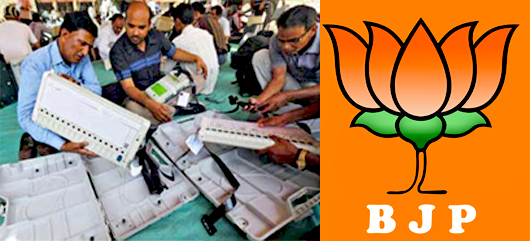New Delhi, Sept 16: Counting of votes began on Tuesday in three Lok Sabha and 33 assembly constituencies spread across 10 states where bypolls were held on September 13, with stakes high for BJP.
 The three Lok Sabha seats are in Vadodara (Gujarat), vacated by Prime Minister Narendra Modi, Mainpuri (Uttar Pradesh) and Medak (Telangana) while 11 assembly constituencies are in UP, nine in Gujarat, four in Rajasthan, two in West Bengal, five in Northeastern states and one each in Chhattisgarh and Andhra Pradesh.
The three Lok Sabha seats are in Vadodara (Gujarat), vacated by Prime Minister Narendra Modi, Mainpuri (Uttar Pradesh) and Medak (Telangana) while 11 assembly constituencies are in UP, nine in Gujarat, four in Rajasthan, two in West Bengal, five in Northeastern states and one each in Chhattisgarh and Andhra Pradesh.
24 of these assembly seats were held by BJP and one each by its allies Apna Dal and TDP.
After BJP's near-total sweep of the 80 seats in Uttar Pradesh in Lok Sabha polls just four months ago, it is to be seen whether the party can retain its 10 seats. One seat was earlier with its ally Apna Dal.
Last month, the saffron party had received a jolt in assembly byelections suffering a 4-6 defeat at the hands of the RJD-JD(U)-Congress alliance in Bihar and yielding two strongholds to Congress in Karnataka and Madhya Pradesh.
The bypoll results, seen as yet another test of Narendra Modi government's popularity since it assumed power in May, are also important as BJP is preparing for polls in Haryana and Maharashtra next month where it hopes to oust the Congress.
Around 53 per cent votes were polled in the seats in UP, including Mainpuri vacated by Samajwadi Party supremo Mulayam Singh Yadav. SP has fielded Tej Pratap Singh Yadav, the grandson of Mulayam's elder brother and the challenge for it is not just to win the seat again but also to maintain the big margin.
The 11 assembly seats in UP, whose outcome may be a pointer to which way the political wind is blowing in the run up to 2017 assembly polls, are Saharanpur Nagar, Noida, Thakurdwara, Bijnor, Nighasan, Balha, Sirathu, Rohaniya, Hamirpur, Charkhari and Lucknow East.
In Rajasthan, it is a close contest between main opposition Congress and the ruling BJP, which would try to retain all four seats and maintain a tally of 163 in the House of 200. The four assembly seats in Rajasthan saw a voting figure of 66 per cent.
The counting of votes would begin in four district headquarters of Jhunjhunu, Ajmer, Kota and Bharatpur tomorrow at 0800 hrs, Chief Electoral Officer Govind Sharma said in Jaipur.
Trinamool Congress is hoping to retain two assembly seats of Basirhat Dakshin and Chowringhee in West Bengal in the face of Saradha chit fund scam that has already ensnared some of its leaders.
In Gujarat, Narendra Modi's successor as chief minister Anandiben Patel is facing her first big test with the bypolls in Vadodara LS seat and in nine assembly constituencies, all held by BJP earlier.
It is the first election in Gujarat in more than 12 years that BJP fought without its star campaigner Modi. In Medak, TRS' K Prabhakar Reddy contested against BJP's T Jayaprakash Reddy in Medak, the seat vacated by K C Chandrasekhar Rao on becoming Telangana Chief Minister.
TDP is trying hard to prove it won't be easy to conquer its bastion Nandigama assembly in Krishna district where it is in a direct fight against Congress.
Congress again faces challenge in Assam against BJP as well as perfume baron Badruddin Ajmal's All India United Democratic Front. The assembly seats were bypolls were held are Lakhipur and Silchar, both held by Congress earlier. Jamunamukh was held by AIUDF.Counting of votes will also be held for Rangang-Yangang seat in Sikkim, Manu in Tripura and Antagarh in Chhattisgarh.





Comments
Add new comment